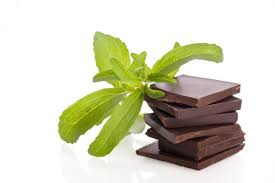Stevia – The Natural Sugar Substitute

Stevia – The Natural Sugar Substitute
Stevia is a herb grown in Brazil and Paraguay. Its extract is a sweetener and sugar substitute. It is heat stable, pH dtable, and not fermentable and cannot caramelize. Stevia is 250 – 300 times more sweeter than sugar, but it has NO CALORIES. Hence it makes it attractive for diabetics. The stevia leaves contain potassium, zinc, magnesium, iron and vitamin B3. The fiber content of stevia leaves helps in curing constipation and promotes digestion.
The sweetness in the stevia leaves is due to the presence of a substance called as steviol glycosides. Steviol glycosides are isolated and purified from the leaves of the stevia plant and approved for use in many countries. Steviol glycosides with high rebaudioside content are Generally Recognized As Safe (GRAS) for use as a tabletop sweetner.
How is Steviol Glycosides Extracted?
Steviol glycosides are obtained from the stevia leaf, filtered, and purified. The sweet molecules in the stevia plant are extracted by the following steps.
The steps of the extraction process may include:
- Crushing the leaves
- Extracting with water
- Filtering and separating the liquid from plant material
- Further purifying the extract with water or food grade alcohol
- Drying – to obtain high purity stevia leaf extract.
This process yields purified stevia extracts, which imparts more sugar like taste than crude stevia extracts.
Benefits of Stevia
- Stevia is a natural sugar substitute for diabetics, as it does not provide calories, but only sweetness.
- Reduces the risk of pancreatic cancer
- Stevia increases sodium excetion and urine output.
- It can potentially help to lower blood pressure.
- It can dilate blood vessels.
- Stevia contains cardiotonic actions, which can normalize blood pressure and regulate heartbeat.
- It has strong bactericidal activity against a wide range of pathogenic bacteria.
- It posses antioxidants.
- Stevia has proved to reduce dental plaque.
- Although it does not provide calories, it has not shown any direct effect on weight loss. Research found that people did not overeat after consuming stevia.
How Safe is Stevia?
FDA has approved the use of isolated chemical (steviol gylcosides / Rebaudioside) from stevia as food additive. These chemicals are termed as “Generally Recognized As Safe” (GRAS). Based on this approval, many products have the legal go-ahead to use these compounds isolated from stevia, in their no-calorie sweeteners.
Stevia is also considered safer than other sugar substitutes such as sucralose and aspartame.
Caution: Stevia may interact with anti-fungal, anti-inflammatory, anti-microbial, anti-cancer, anti-viral drugs. They also interact with appetitie suppressants, calcium channel blockers, cholesterol lowering drugs, drugs that increase urination, and fertility agents. Hence inform your doctor, if you are using stevia.
How is stevia used?
Stevia sweeteners are used throughout Asia and South America. More than 5,000 food and beverage products use stevia as a sweetening agent. They are also used as table top sweeteners, for baking as well as for other everyday products instead of sugar. Stevia is used in the following products.
- Ice cream
- Desserts
- Chocolates
- Sauces
- Yogurts
- Pickled foods
- Bread
- Soft drinks
- Chewing gum
- Candy
- Seafood
- Prepared vegetables.
Uma Maheshwari PS
Dietitian, Happy Living Diet Clinic
www.facebook.com/happylivingdietclinic
+91 99000 46344










